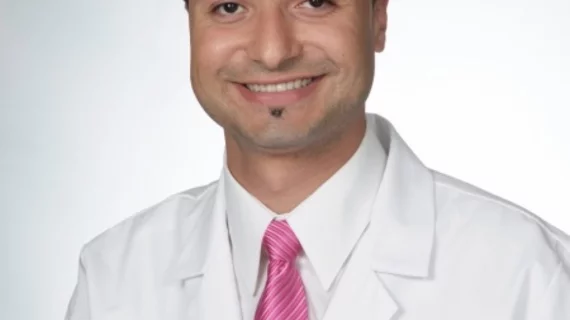Radiologist reflects on life, hope and the American dream
Driss Raissi, MD, a radiologist at the University of Kentucky College of Medicine in Lexington, had an emotional experience one day in the operating room, and he shared the story in a new commentary published by the Journal of the American College of Radiology.
Raissi began his story with a bit of context about his own personal journey from North Africa to studying radiology in the United States.
“I came to America speaking broken English and settled in Brooklyn, New York, in pursuit of the ‘American dream,’” he wrote. “Living in my adoptive melting pot, I journeyed uneventfully through my radiology training and into practice. As a young academic interventional radiologist in the Southeast, each day, for me, meant another day living the red, white, and blue dream. How sweet it was!”
One day, Raissi wrote, he was preparing a 35-year-old patient with metastatic cancer for a procedure when he noticed the swastika tattoo on the man’s chest.
“I found myself doing a double take to see if it really was what I thought,” Raissi wrote. “My fear and discomfort were confirmed: it was indeed that ugly symbol of hate, of death, of so much pain and suffering, a symbol that seemed extinguished from mainstream events.”
As much as seeing that tattoo affected him, however, he knew he had to move forward and finish preparing the patient. He administered subcutaneous lidocaine, “an act intended to reduce pain and suffering,” and reassured the patient as the sedation quickly had its intended effect.
“This was not my first patient with a swastika tattoo, but I had never before been challenged by it so directly,” Raissi wrote. “As someone who believes deeply in the benevolent traits of the human race and the melting pot’s beautiful ideal, I could not shake the horrible and eerie feeling provoked by that symbol.”
The procedure was a success. Once it was done, he spoke with the patient again, further establishing a positive relationship. And once radiologist and patient went their separate ways, the experience stayed with Raissi. He felt humility and thankfulness. He felt “humbled to be a healer” and he was thankful he had the opportunity to help patients when they needed help the most.
“Now more than ever, we must uphold the highest standards of humanism to drown the voices of hate and quash the suspicion of the ‘other’ so that the art of healing body and soul prevails,” he concluded. “It is the only way forward in this complex American dream.”

